Armchair War-Gaming Isn’t Helping Syrians
Leading lights of the left say we should be prodding great powers to force compromise on Syria. This is not our job. Our duty is solidarity with the oppressed and the tortured.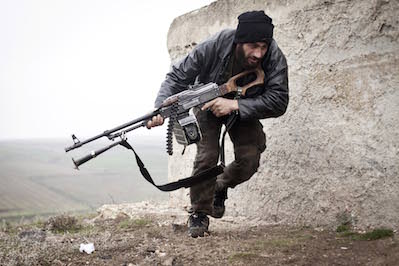
By Stanley Heller
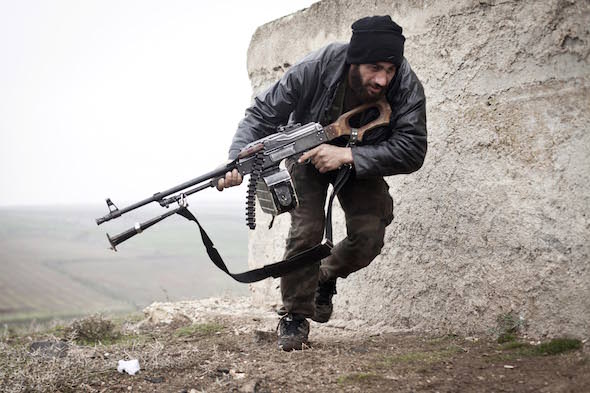
A Free Syrian Army soldier takes cover during fighting with the Syrian army. (Virginie Nguyen Hoang / AP)
The full-scale entry of Russia into the carnage in Syria has unfortunately befuddled a number of people on the left. Justifiably disgusted with the imperial adventures and genocides of the West, they take a twisted leap in logic and see Russian bombing as a way to move things forward. One hears talk of Syrian President Bashar al-Assad now being the “lesser evil,” compared with Islamic State. The revolutions dubbed the Arab Spring are consigned to the recycle bin of history. It’s time to get realistic, we are told. The talk is of geopolitics and national interests and spheres of influence. As for the Syrian people themselves, we’re told their rebellion got hijacked years ago, so their voices no longer count.
Now it’s one thing to mock and insult efforts by Western imperial powers to install their proxy armies in Syria. That criticism is correct, and I dissected one mad idea for a Western alliance with a “reformed” al-Qaida here. But it’s quite another thing to write off the incredible efforts of thousands of Syrians struggling against murderous attacks by multiple enemies. Yet that’s what this geopolitical left advises us to do.
It simply dismisses the hundreds of thousands who took to the streets in 2011 to protest the Assad mafia-family rule and the thousands who still actively demand human and political rights. In an Oct. 7 KPFA radio interview, Vijay Prashad—professor of international studies at Trinity College and frequent “Democracy Now!” guest—said, “The civic rebellion died off. Today, of course, remnants of that rebellion exist, they are in a state of great demoralization. … They exist, but they are no longer players in the struggle. I feel for their sense of outrage, but they are out of the game.”
Writing in The Independent, Robert Fisk says the Free Syrian Army (FSA), the loose amalgam of hundreds of groups that arose to defend demonstrations against Assad’s bloody repression, became “corrupted” and its members defected to the Islamists. He calls the FSA the “preposterous Free Syrian Army” and says there are no “good guys” in Syria. On Oct. 19, he bragged about the new power of Assad’s Russian-supercharged army.
Stephen Cohen, a major writer for The Nation, goes further and warns that all the revolutions and mass uprisings of the Middle East are a danger. In early September, he did a radio interview entitled “Has Russia Been Right All Along About the ‘Arab Spring’?” (It was, believe it not, accompanied by early Soviet military music. Perhaps it wasn’t of his choosing, but the music is symptomatic of the sentimental delusion that identifies Putin Russia with a revolutionary Soviet Union.)
Cohen answers his own question, saying Russia indeed has been right all along. It “warned from the beginning that the Arab Spring with its toppling of governments would not lead to democracy, but would kick over ancient tombstones and release terrible forces, partly in the form of the very radical murderous Islamic type of movement.” He says, “Surely on the question of overthrowing Assad … in these circumstances of this ISIS plague … Russia is right.” He thinks the U.S. should “embrace” Russian military help in Syria.
Then there’s Patrick Cockburn, the award-winning journalist for the U.K.’s Independent. From him we learn on Sept. 5 that Syria’s 4 million refugees mostly came from opposition areas that were “systematically bombarded by government aircraft and artillery, making them uninhabitable.” Nevertheless, he claims Syrians are terrified of Islamic State and that the British need to bomb those forces in open coordination with Assad ground troops. A month later, he writes a piece under the headline, “Let’s welcome Russia’s entry into this war.” He tells us that “the US-Soviet Cold War, and the global competition that went with it, had benefits for much of the world.” Russia, he says, is “at least a heavy hitter, capable of shaping events by its own actions.” He says Assad and the proxy armies of the U.S., the Saudis and other local powers will be “forced into compromises by Washington and Moscow.”
This is all rather repulsive: leading lights of the left deciding that popular struggle is over (or, for Cohen, wrong in the first place) and now we should be prodding great powers to come to terms and force some compromise on the Syrians. This is not our job. Our duty is solidarity with the oppressed and the tortured.
The Revolutionary Syrians
Anyway, it’s not true that all that’s left in Syria is Islamists and Assad. Most obviously there is Rojava, the liberated area carved out by Syrian Kurds and allies in northern Syria. Who has not heard of the city of Kobani and its successful resistance to Islamic State attack? The defense was led by the People’s Defense Units, known as the YPG, a group close to the Marxist/anarchist Kurdistan Workers’ Party. Yet it was not only Kurds who fought there. The not-so-“preposterous” Free Syrian Army units took part, too. Early in October, the YPG formed a bloc with Syriac and secular Free Syrian Army forces with a declared goal of liberating al-Raqqa, the Islamic State “capital.”
Then there is the Southern Front. I’m told by Syrians that it’s fighting for democracy and is opposed to any foreign intervention in Syria. The reputable Middle East Eye website had articles about the group here in June and here in September. After some success this year, the Southern Front had a big reversal. Still it fights on. Supposedly it gets weapons from Jordan and the U.S. For some, this makes the group tools of Western imperialism. Yet the YPG Kurds send GPS coordinates to U.S. Air Force officers, which the United States uses to bomb Islamic State. The U.S. also air-drops weapons to the YPG Kurds. But no one on the left criticizes the YPG as “tools.”Consider the story that’s giving satirists a field day. The Pentagon admitted that its half-billion-dollar program to train Syrians to fight Islamic State had only resulted in the production of four or five fighters. Take five minutes to have a grim laugh. Then think about it. The U.S. can’t get recruits because the Pentagon is demanding that the weapons be used only against Islamic State, not against Assad. It seems that the Syrians themselves see Assad as the main evil, and they refuse to accept the deal, no matter how much they hunger for weapons.
There’s plenty of reason for that rejection. The Islamic State head-choppers are disgusting and the enemy of all that most hold dear, but Islamic State did not create a network of prisons where they tortured thousands to death. They didn’t rain barrel bombs down on every population center they lost. Syrian professor Yasser Munif, who teaches at Emerson College in Boston, estimated in July that 95 percent of civilian casualties were caused by Assad forces (to see his statement, go to 06:00 in the video). Munif is an open supporter of the Syrian revolution.
Hamid Imam is from al-Raqqa, the city in Syria where Islamic State maintains its “capital.” Much of his family is there, and he hates Islamic State with a passion. Yet he joined with several score others recently to protest the Russian bombings. It seems he is perfectly able to understand that the Syrian people have multiple enemies, something that seems beyond the comprehension of the geopolitical left.
Of great note are the people of Kafranbel, a town in the northwest of Syria. It became famous for demonstrations with signs and banners in English, often very witty. The regime bombed the rallies, which were suspended for a while, but the signs have reappeared, as seen in this photo of demonstrators opposing the Russian bombing:
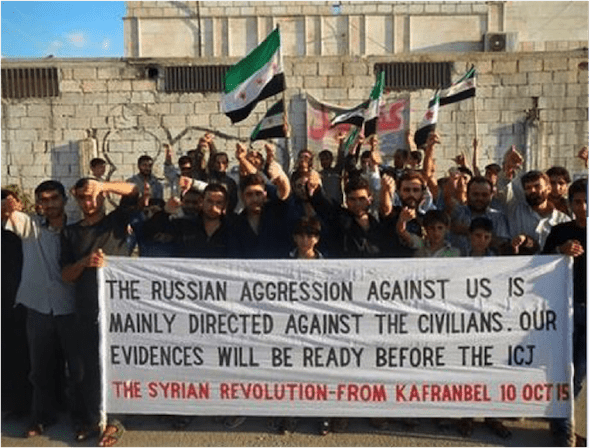
Kafranbel banners are often humorous or show artistry, such as these showing Assad as “The Godfather” and Islamic State emerging from the belly of the “Alien” Assad regime:
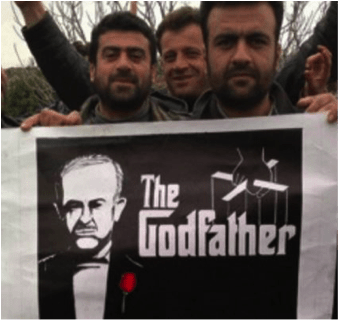
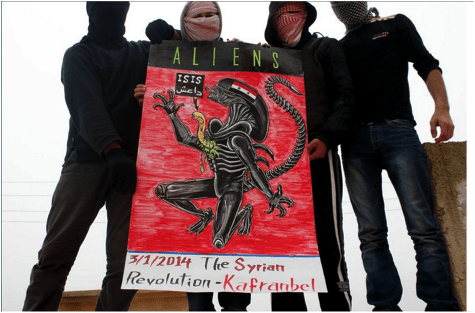
Another group that must be mentioned is the Local Coordination Committees of Syria (LCC), a network of 70 media and street activist groups connected to the grass-roots revolt inside Syria. Since March 2011, the LCC has played a key role in organizing anti-regime demonstrations and disseminating information about the revolution. According to the Carnegie Endowment for International Peace, the LCC refuses to provide financial support or weapons to the Free Syrian Army or any armed groups, as that would betray its ethos and policy of nonviolence.
Razan Zaitouneh, winner of the 2011 Sakharov Prize for Freedom, was a major figure in the LCC. She appeared several times on “Democracy Now!” The last time, in 2013, she gave an impassioned description of the effects of Assad’s chemical attacks, which had just taken place. She was kidnapped a few months later—probably by Islamists—along with her husband and two associates and has not been heard from since.
On Oct. 2, the LCC made a statement about the Russian attack that included these words: “The Local Coordination Committees in Syria joins Syrians across the country in categorically condemning the Russian intervention in Syria. In our mourning and sadness, we share the pain of all those who have lost loved ones due to this barbaric aggression.”
False “Realism”
The argument that it’s good that all the big powers are involved because now something will be worked out is not sad-but-wise “realism,” but pure bosh. It’s just armchair war-gaming. One could have made that same argument a hundred years ago as Britain entered the Great War or when Sweden’s Gustavus Adolphus entered the war then raging in central Europe in 1630. That spat, the Thirty Years’ War, went on for 18 additional years.
The left shouldn’t be engaging in war games and geopolitical speculation. Our job is solidarity—with the Syrian people, the Kurds and the hundreds of thousands of Palestinian refugees in Syria. We should be finding ways to help them with supplies and statements of support, and with withering criticisms of the Russian, Iranian, Saudi, Turkish, U.S., United Arab Emirates and Hezbollah war-makers engorging themselves on the conflict.
In mid-October, a statement entitled “ ‘Hands Off Syria’ Applies to Russia Too” was published. It had several dozen initial signers, among them Sir Gerald Kaufman, the longest-serving member of the British Parliament; Bill Fletcher Jr., former president of the TransAfrica Forum; Ella Wind of the Middle East North Africa Solidarity Network; poet and professor Andrei Codrescu; and William Paterson University professor Stephen R. Shalom. I signed it too. Take a look at it here.
Stanley Heller is host of The Struggle, a weekly news magazine at www.TheStruggle.org. He can be reached at [email protected].
Your support matters…Independent journalism is under threat and overshadowed by heavily funded mainstream media.
You can help level the playing field. Become a member.
Your tax-deductible contribution keeps us digging beneath the headlines to give you thought-provoking, investigative reporting and analysis that unearths what's really happening- without compromise.
Give today to support our courageous, independent journalists.
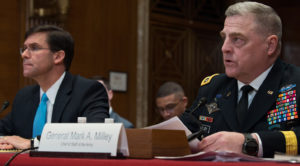
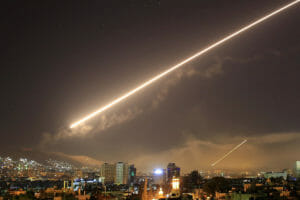
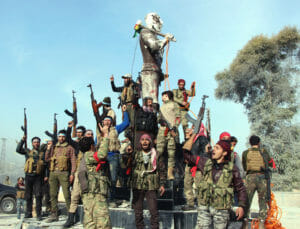
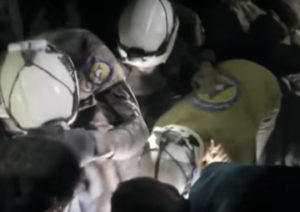
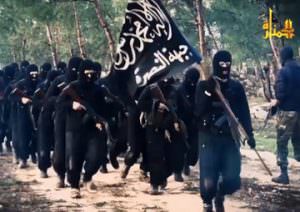
You need to be a supporter to comment.
There are currently no responses to this article.
Be the first to respond.